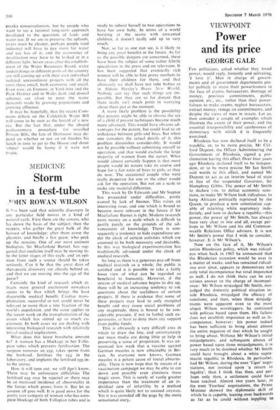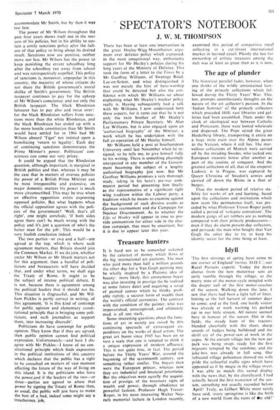VIEWPOINT
Power and its price
GEORGE GALE
Rhodesia has now declared itself to be a republic, or, to be more precise, Mr Clif- ford Dupont, the Officer Administering the Government of Rhodesia, signed a pro- clamation having this effect. Over four years ago Rhodesia declared itself to be indepen7 dent, or to be more precise Mr Ian Smith said words to this effect, and named Mr Dupont to act as an interim head of state in lieu of the suspended Governor, Sir Humphrey Gibbs. The power of Mr Smith to declare UDI, to defeat economic sanc- tions, to make Mr Wilson look ridiculous, to hang Africans politically reprieved by the Queen, to produce a new constitution cap- able of retaining white supremacy inde- finitely, and now to declare a republic—this power, the power cif Mr Smith, has always been very clear to one and all, except per- hops to Mr Wilson and his old Common- wealth Relations Office advisers. It is not Mr Smith's power• that I wish to consider, however. It is Mk Wilson's.
Now on the face of it, Mr Wilson's entire Rhodesian policy, which was ridicul- ous when back in 1965 he announced that the Rhodesian secession would be over in a matter of weeks, and has remained ridicul- ous ever since, appears to demonstrate not only total incompetence but total impotence as well. I do not think there can be any serious answer to the charge of incompet- ence: Mr Wilson misjudged Mr Smith, mis- judged the domestic political situation in- side Rhodesia, misjudged the efficacy of sanctions; and then. when these misjudg- ments were apparent even to the most abject Wilson worshippers, he continued with policies based upon them. His failure does not establish impotence as well as in- competence, however: his power indeed has been sufficient to bring about almost the entire negation of that which he sought to bring about. Without Mr Wilson's initial misjudgments, and subsequent abuses of power based upon those misjudgments, it is very much to be doubted whether Mr Smith could have brought about a white supre- macist republic in Rhodesia. In particular, had Mr Wilson, during the HMS 'Tiger' nego- tiations, not insisted upon 'a return to legality', then I think that then, and per- haps only then, a settlement could have been reached. Almost two years later, in the HMS 'Fearless' negotiations, the Prime Minister showed the diplomatic skill of which he is capable, leaning over backwards as far as he could without toppling to
accommodate Mr Smith, but by then it was too late.
The power of Mr Wilson throughout the past four years shows itself not in the suc4 cess of his policies, but in his ability to su.s.4
tain a. costly sanctions policy after the fail- ure of that policy to bring about its desired
result. Sanctions now are punitive, neither more nor less. Mr Wilson has the power to keep punishing the errant schoolboy long after the schoolboy ran away from school and was retrospectively expelled. This policy of sanctions is, moreover, unpopular in this country, the majority of whose citizens do not share the British government's moral dislike of Smith's government. The British taxpayer continues to pay for the upkeep of Mr Wilson's conscience; and not only the British taxpayer. The black Rhodesian labourer has to pay also and twice over: for the black Rhodesian suffers from sanc- tions more than the white Rhodesian, and the black Rhodesian has ended up with a far more hostile constitution than Mr Smith would have settled for in 1966 had Mr Wilson aboard 'Tiger' not insisted upon a humiliating 'return to legality'. Each day of continuing sanctions demonstrates the Prime Minster's power. Politicians' con- sciences can come out very pricey.
It could be argued that the Rhodesian question, although important, is marginal in British politics and that, whereas it may be the case that in matters of oversea policies the power of a British Prime Minister can be most irresponsible and extensive, on major domestic matters his power is much more circumscribed. This may be true when an effective opposition exists expressing opposed policies. But what happens when the official opposition agrees with the poli- cies of the government? 'Well, that's all right', one might conclude, 'if both sides agree there can't be much wrong with the policy and it's just a question of who's the better man for the job'. This would be a very foolish conclusion indeed.
The two parties—or two and a half—are agreed at the top, which is where such agreement matters, that Britain should join
the Common Market. If we do join, whether under Mr Wilson or Mr Heath matters not for this argument, then a handful of poli-
ticians and bureaucrats will have decided that, and under what terms, we shall sign the Treaty of Rome. It ought to be the subject of intense political debate. It is not, because there is agreement among the political leaders that it should not be. This situation is disgraceful, and Mr Wil- liam Pickles is partly correct in writing, of this agreement, 'It is this kind of contempt for public opinion and elementary consti- tutional principle that is bringing some poli- ticians, and such journalists as support them, into increasing discredit'.
Politicians do have contempt for public opinion. They know that if they are agreed, then public opinion cannot find political expression. Unfortunately—and here I dis- agree with Mr Pickles—I know of no con- stitutional principle which finds expression in the political institutions of this country which declares that the public has a right to be consulted on matters of vast moment affecting the future of the way of living on this island. It is the politicians who have the power,and if the leaders of the two—or three—parties are agreed to abuse that power by signing the Treaty of Rome then, as usual, the public will just have to make the best of a bad, indeed some might say a treacherous, job.,



































 Previous page
Previous page